Feel a bit smarter yeah?
Look at this
Just look at it. Grabbed it from here.
sigh
This is pretty fucken sad lemme tell ya.
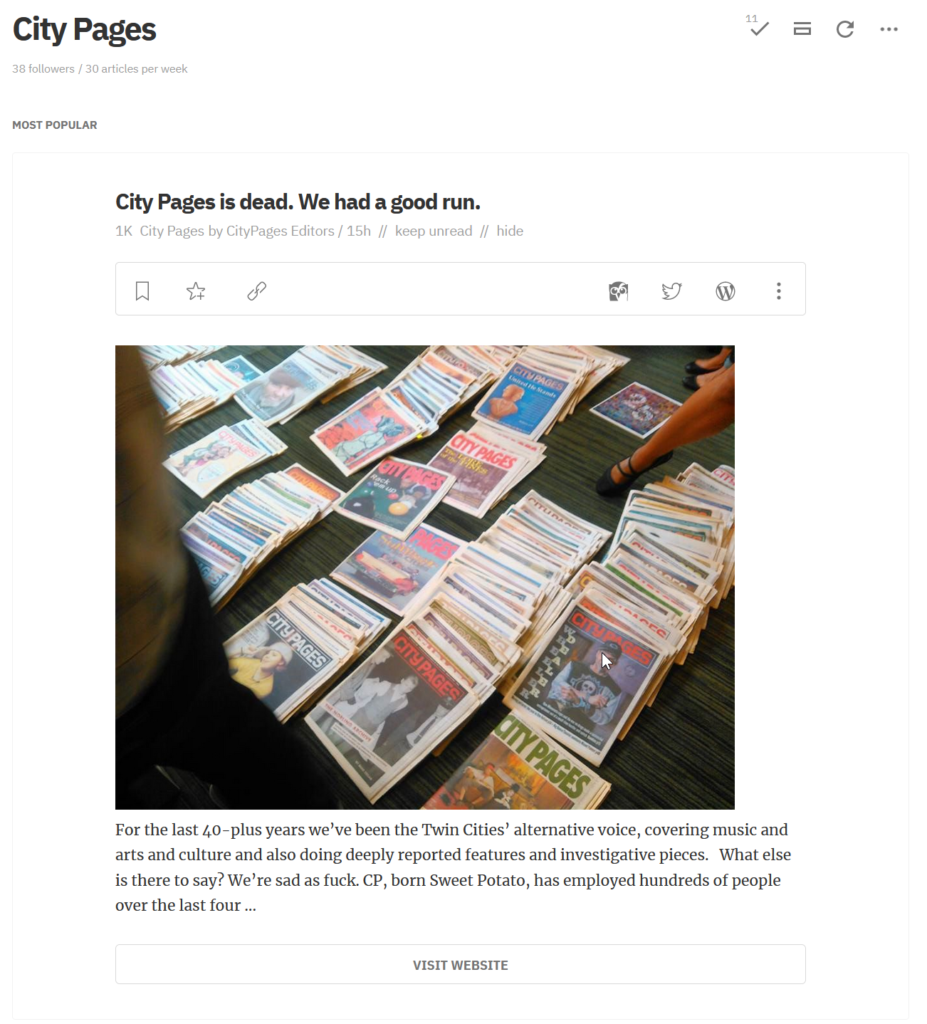
What else is there to say? We’re sad as fuck. CP, born Sweet Potato, has employed hundreds of people over the last four decades; below you’ll find a farewell from the edit staffers who rearranged those Titanic deck chairs right up until the very end.
City Pages is dead. We had a good run..
I found my first apartment on its classifieds pages. My first job too as a barista in a Dunn Brothers location that no longer exists.
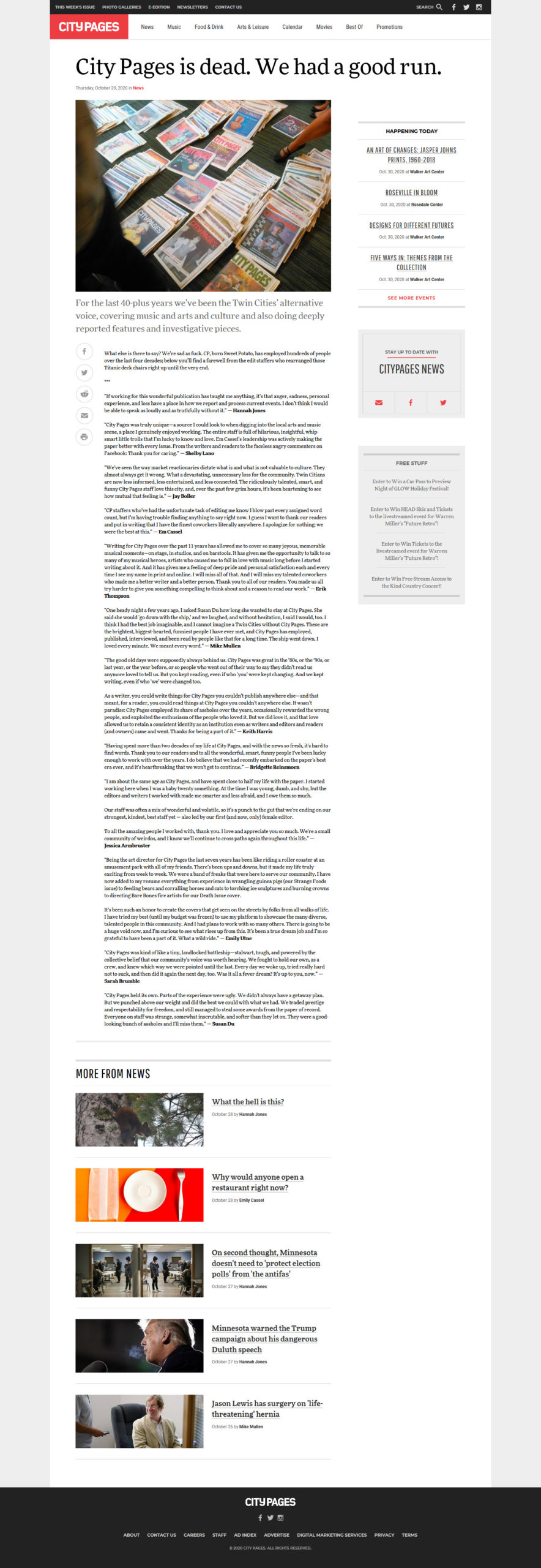
<a href="https://www.flickr.com/people/nullrend/">nullrend</a> posted a photo:
 The last stack of City Pages issues. Ever
The last stack of City Pages issues. Ever
<a href="https://www.flickr.com/people/nullrend/">nullrend</a> posted a photo:
 I'm so happy I got a new bed. I'm flat broke after spending a ton of money on it but it's been totally worth it.
I'm so happy I got a new bed. I'm flat broke after spending a ton of money on it but it's been totally worth it.
In preparing doc request responses, I just discovered my client forwarded every email convo we’ve had about her case to a friend, so they could discuss, in writing, the strengths and weaknesses of her case.
— Lawyer Cat* (@LawyerCat_) October 28, 2020
The replies are fucken hilarious too.
With the closing, 30 people will lose their jobs. It adds Minneapolis-St. Paul to the growing list of U.S. cities with no more so-called “alternative” newspapers, which rose out of the 1960s counterculture scene and flourished through the 1990s, throwing sharp elbows in political coverage and spotting the edgiest ideas in arts.
Source: City Pages is closing, ending era of Twin Cities alternative weeklies – StarTribune.com
This fucken sucks
‘k, so in a previous post I wrote how I reworked my note-taking and went back to plain text. I had to make a few changes since then:
Switched out Epsilon for Markor, which is prettier and less of a pain in the ass. But trying to set it up is when I started running into an issue with Nextcloud:
It does not support bidirectional folder sync. At all.
The way Nextcloud syncs everything means you have to access your files through the Nextcloud app instead of being able to use your usual app to open a file. It’s not that much of a change but it does prove annoying because that change is forced on you by the application instead of you (the user) adjusting your workflow organically. People have been requesting this ability since 2016 and the app still doesn’t have it.
When I was using Dropbox as my syncing backend my workflow would be like this:
With Nextcloud it goes something like this:
To replicate the default desktop behavior (syncing to local filesystem) you end up having to use other apps like FolderSync. This way files and folders are available just like any other file on the Android device, letting you use automation or customization apps without issues, and saving you from having to configure syncronization settings for each app. Looking at you, Joplin.
My suspicion is Nextcloud developers are doing it this way to increase your awareness of the brand and the application, following the footsteps of Dropbox. For the longest time Dropbox was a rock-solid syncing application that did one thing and it did it really well, but now they’re trying to force changes nobody likes in an effort to make more money.
If this is indeed the case Nextcloud developers are learning all the wrong lessons from Dropbox’ failure to understand what it had. Instead of strenghtening its core they’re throwing a million other things at the wall to see what sticks:
Nextcloud has a chance to do that one thing well and do it better than Dropbox ever did— that is, file syncing. I feel they’re consciously choosing to throw it away because they want to get a bit more clout and a bit more money. If they keep at it they’re going to end up like Mozilla.
Some people, women as well as men, find the idea of women in power terrifying and hence will believe anything about them.
Source: Why Was She So Hated? | by Lynn Hunt | The New York Review of Books
Such as then as it is now.
It might seem ludicrous to sacrifice public health to preserve indiscretion as an ideal of college life, but that life has never aspired toward well-being in the first place. It’s a deliberate feature of college, not a side effect. “Youthful indiscretions were tolerated and even encouraged as part of the process of upward social mobility that the college facilitated,” Thelin writes.
Source: Why Did Colleges Reopen During the Pandemic? – The Atlantic
You can only do this if you’re white, however. If you’re not white, you’ll likely become another customer of the carceral state and universities are more than happy to throw you down that well.
In the past 60 years colleges have sold the aspirational aspect as something worthy to be experienced no matter the cost. For-profit schools benefited from the halo effect.
No more.
GPT-3 is a communication revolution that threatens to eliminate the possibility of information about the original human intentionality behind a given text post.
Source: GPT-3: Informational Hyper-Inflation – Never Met a Science
Unless you see the name of someone who is a real human on a text you cannot be sure that text was written by an actual breathing human. Even then you’re not assured the text was actually written by a human, merely that it was vetted by a human who then decided it was okay to put their name to this text.
You still cannot be sure the text was actually written by them. As the author of that post says this will only help drive written media away giving priority to audio and video media.
How long until those are mediated by AI? Nvidia is already making a go at it with the purpose of reducing used bandwidth but it won’t be long before the tech is being used to fake entire appearances.
Source: Game Music Festival 2020 – THE SYMPHONY OF FOUR WORLDS (live stream) – YouTube
As an avid player of all Supergiant Games productions hearing new arrangements of the game soundtracks is amazing.
Stephen Milton, who helped to design and build the Gigabit Now service in Sea Ranch, California explained that his company had to obtain permission from 23 separate local, county, and federal granting agencies to get the new project up and running. Broadband provider Sacred Wind out of New Mexico wrote in a filing to the FCC that an application involving one landowner and one authorizing jurisdiction commonly takes 2–4 years to complete, while something more complex, that involves more than one piece of land spanning multiple authorizing jurisdictions, can take anywhere from 4–8 years to complete. Slow response times translate into delays and adoption lags.
Source: The curious case of Romanian broadband | by Will Rinehart | The Benchmark | Oct, 2020 | Medium
Here in the US most of these bumps are by design by way of from redlining, NIMBYism, and plain old lack of foresight from local governments. This in turn gave more power to state governments who in turn receive most of their regulatory guidelines from the companies they’re supposed to be regulating. A lot of states now explicily forbid cities, counties, and municipalities from even trying to enact their own regulations when it comes to broadband, specially publicly owned infrastructure.
Wealthy neighborhoods will always see at least two companies deal with the regulatory gauntlet as they know the profits to be made will be worth it, which in turn helps attract more wealthy people to the neighborhood. Poor neighborhoods have not seen that kind of investment in decades, and will likely never see it in the foreseeable future. Here in Minneapolis one company is rolling out fiber throughout the city and North Minneapolis isn’t even in the plan for them. This has been a historical goal of racist and classist local governments.
Should government at any level try to change the rules, companies involved in last-mile telecom duopolies will scream bloody murder and call up their wholly owned GOP subsidiary in Congress to keep the status quo.
<a href="https://www.flickr.com/people/nullrend/">nullrend</a> posted a photo:
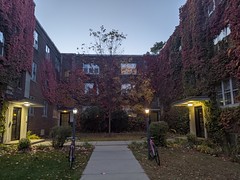 I do like how it looks year long
I do like how it looks year long
I like Flickr. I have been a paying user for years, since the heady days of Web 2.0. Very photo, so web.
But their documentation fucking sucks. It went down in quality when Yahoo took over, and SmugMug isn’t doing much better. But anyway.
Here’s how to reorganize the order in which albums in the Flickr mobile app show up:
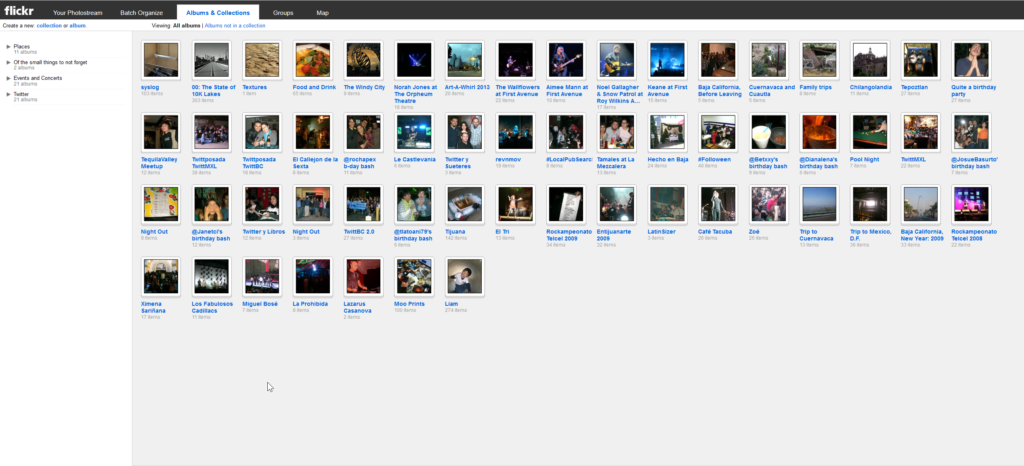
Making this change will have effect in two places:
– The Albums page on the web
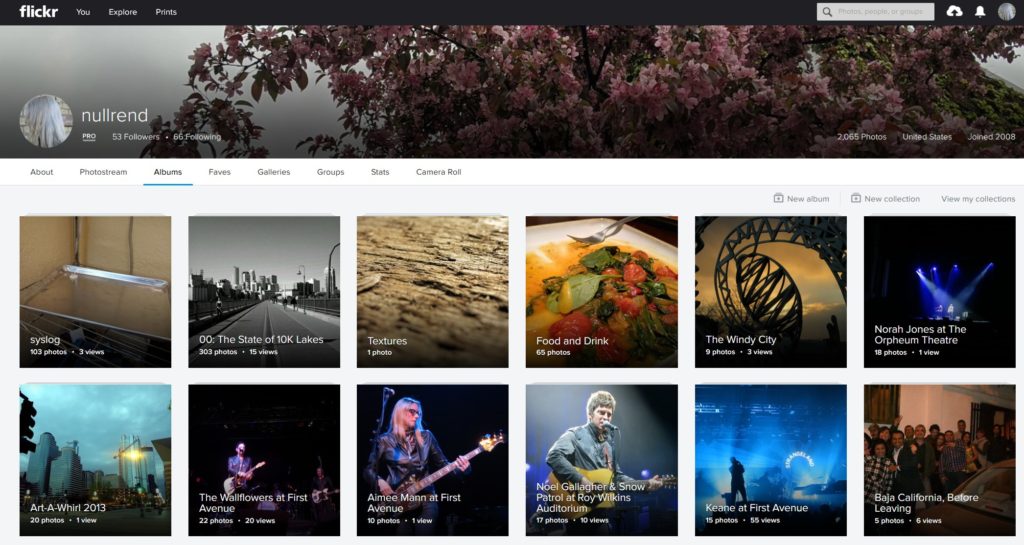
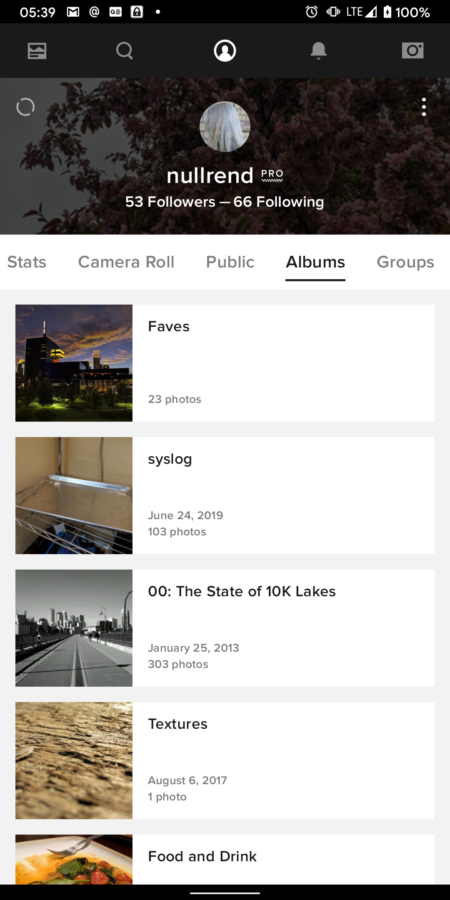
Neither the Flickr Help Center nor the Help Forum have any posts about this. Now, I’m using the Android app but I assume the iOS-based versions will also follow the ordering set in the Organizr panel.
I wish Flickr enabled a few things:
– Sorting by album metadata (alphabetically, album creation date)
– Sorting by picture metadata (make bigger/smaller albums show up first/last). This would include sorting by last album upload, so albums used the most get shown first.
– Make Collections a first-class citizen on the site. They’ve been relegated as a little used organization tool that no one uses and when it does get used it isn’t showcased.
Flickr has so much to win now that Instagram is being integrated ever more into facebook’s grubby infrastructure.
Source: Chapter 1: The Ancients’ Bucket List – The Analog Antiquarian
This blog is so, so good, should you like to read about ancient history.